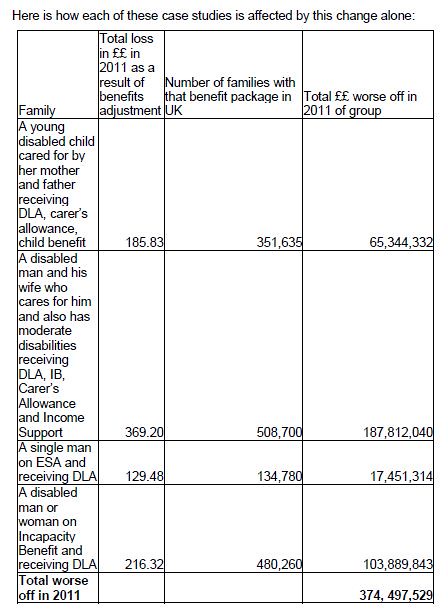Bleak outlook for disabled as Coalition marks one year of office
11 May 2011 09:33 AM
• New Demos report, funded by Scope – Destination Unknown: Spring 2011 marks launch of tracker study of disabled households
• Thousands of disabled people to demonstrate in Westminster
One year after the Government took office, a shocking new study lifts the lid on a drastic reduction in disabled people’s income.
As thousands of disabled people prepare to march on central London to protest the cuts, the new Demos report funded by Scope reveals a startling gap between rhetoric and reality when it comes to the Government’s pledge to protect the sick, elderly and vulnerable.
Twelve months ago the Coalition promised “to introduce arrangements that will protect those on low incomes from the effect of public sector pay constraint and other spending constraints” (1).
Disabled people are more likely to be on low incomes and are more vulnerable to financial shocks (2).
Destination Unknown: Spring 2011, shows that far from being protected, disabled people and their families as a whole find themselves hundreds of millions worse off in 2011.
The tracker study gives concrete evidence to the concerns which are driving thousands of people to protest at a march to Westminster on Wednesday 11 May to demonstrate against the impact of cuts (3).
It follows the first Destination Unknown report which forecast that disabled people faced a drop in their income of over £9 billion during this Parliament.
The report follows five typical disabled households and lays bare the financial impact of the Coalition’s spending cuts and benefits reforms.
The families include:
- A young disabled child cared for by her mother and father
- A disabled man and his wife who cares for him and also has moderate disabilities
- A single disabled woman
The report reveals that the first Government reform to bite is the change in the way benefits are calculated, which sees them increase by the lower CPI inflation measure instead of the higher RPI. This affects support packages such as Carer’s Allowance, Disability Living Allowance (DLA), Incapacity Benefits (IB) and Housing Benefits.

But that is just one part of the cumulative impact of benefit, service and grant cuts.
Combining this effect with increased living costs, disabled people are finding themselves hit from all sides.
This year family A in the report who have a daughter with cerebral palsy are being hit by:
- Disability Living Allowance being increased by the lower CPI inflation measure instead of the higher RPI (£38.88 worse off)
- Child benefits being frozen (£48.55 worse off – not including any further loss from siblings)
- Carer’s Allowance being increased by the lower CPI inflation measure instead of the higher RPI (£43 worse off)
- The local authority having “no budget” to make crucial adjustments to the daughter’s room so she can receive vital, daily therapy
- The local authority not able to provide a modern wheelchair for the daughter
- Increasing fuel prices, which mean they now pay £150-a-month taking their daughter to regular appointments at three different hospitals
One of the parents said:
“If there are further cuts to benefits it will have to come from heating and food bills as there is nothing else we can cut back on”
Indeed, with a raft of spending cuts still to come, the report’s author warns this is only “the calm before the storm”.
Government reforms that will have a major impact on disabled people include a cut of 20 per cent in budget and caseload to Disability Living Allowance and the reassessment of the 1.9 million people claiming incapacity benefits.
Claudia Wood, Head of Public Services and Welfare at Demos said:
“When we launched this study we assumed our first report would show very little changes in the lives of disabled families. In fact, they are already enduring significant cuts to their benefits and service closures, and many are accumulating significant debts in order to get by. It does not bode well for the future. I fear this is the calm before the storm and when we revisit these families in six months time, we will see very serious situations of significant poverty, housing repossession and worsening health.”
Richard Hawkes, Chief Executive of disability charity Scope, said:
“The Government has said that disabled people will be protected. The findings of the Destination Unknown: Spring 2011 will make uncomfortable reading. The simple fact is that daily life costs more if you are disabled, which means disabled people and their families are vulnerable to the cumulative impact of losing a local service, a wage freeze or seeing their benefits adjusted. The Government needs to pay close attention to the unintended consequences of its welfare reforms and spending decisions. If families already have to decide between paying their bills or buying food, what will the picture look like this time next year?”
Demos and Scope recommend:
- Welfare Reform: Scrap the proposal to limit to one year the time people can claim contributory WRAG benefit of ESA moved off of Incapacity Benefits and into the group of people considered fit-for-work with support (WRAG) can claim benefits (ESA)
- Disability Living Allowance: End the inclusion of DLA as a contribution to social care funding; ensure assessment for the new Personal Independent Payment (PIP) reflects costs, not just a determinant of ‘need’.
- Local Government: Carry out a detailed review of the impact of local level cuts
Notes
1 – Coalition agreement: http://www.cabinetoffice.gov.uk/news/coalition-documents
2 – Disabled people are more likely to live in poverty: http://odi.dwp.gov.uk/disability-statistics-and-research/disability-facts-and-figures.php#4
3 – On 11 May disabled people will march to Westminster to raise awareness of the impact Government public spending cuts
http://www.hardesthit.org.uk/
Destination Unknown: Spring 2011 is available to download from www.demos.co.uk/publications/destinationunknownspring2011
The original report Destination Unknown (Oct 2010) forecast £9bn worth of cuts to disability welfare alone.
Find out more about the families and the tracker study: http://www.demos.co.uk/projects/disabilityausterity
Case studies are available.
Contact
Demos
Beatrice Karol Burks
beatrice.burks@demos.co.uk
020 7367 6325
079 2947 4938